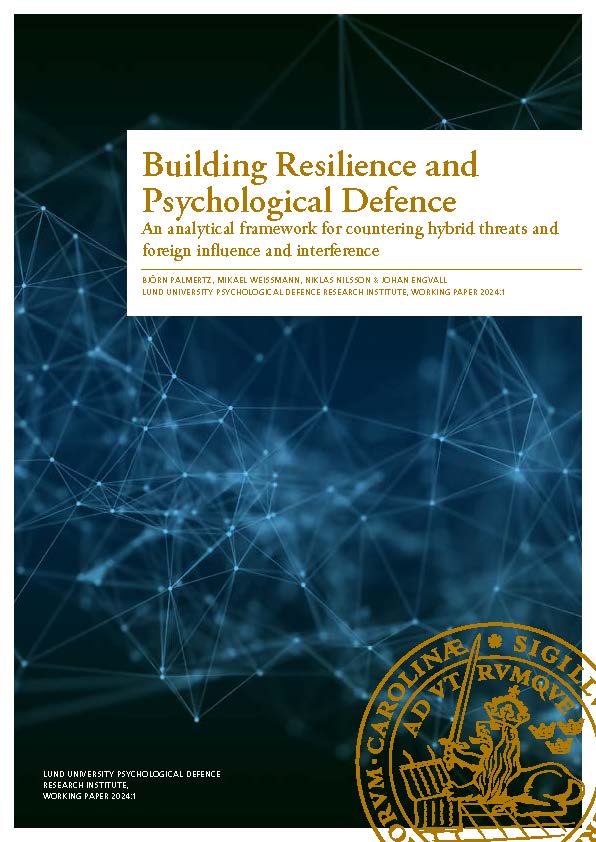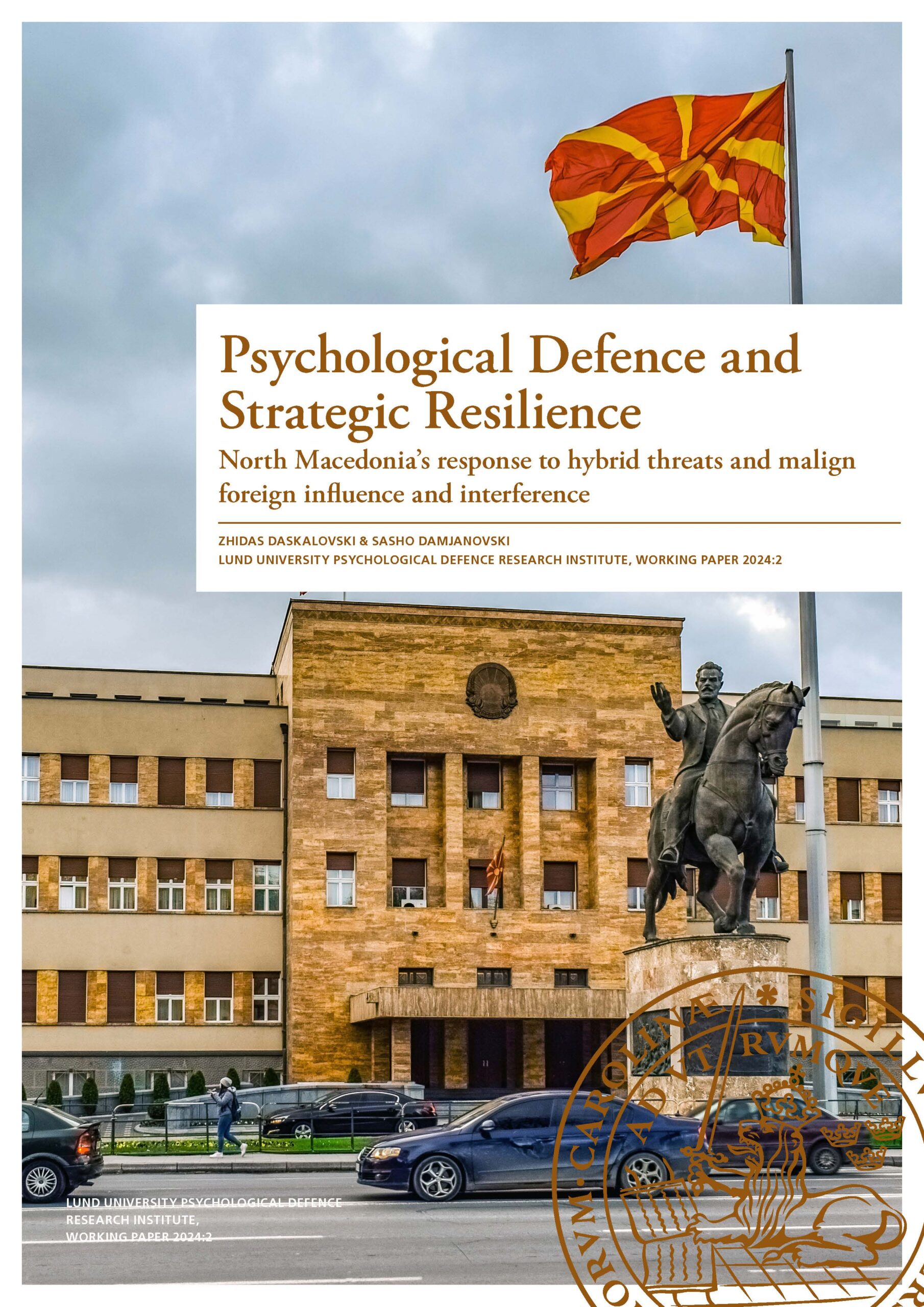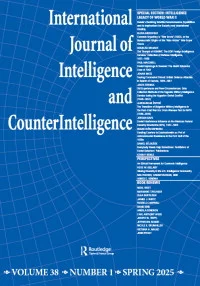Building resilience and psychological defence: Countering hybrid threats and foreign influence and interference
This project addresses different forms of hybrid threats, foreign influence and interference across the entire conflict spectrum including crisis and war by mapping the experiences and lessons of different states and other actors targeted by these types of threats at different levels of conflict.
The importance of building resilience and psychological defence capabilities against various forms of hybrid threats and foreign influences is greater than ever. After Russia’s war of aggression against Ukraine in February 2022 we see before us a seriously deteriorated security policy situation and a very uncertain international development both in Sweden, Europe and globally. New geopolitical challenges have increased the threat regarding, for example, offensive cyber and influence operations by state actors as well as the use of disinformation by irregular actors.
It has become increasingly obvious that resilience and psychological defence capability must be enhanced. This project addresses different forms of hybrid threats, foreign influence and interference across the entire conflict spectrum including crisis and war by mapping the experiences and lessons of different states and other actors targeted by these types of threats at different levels of conflict.
Building psychological defence capacity
The project aims to advance the state of the field with regard to psychological defence capacity building and methods for identifying, analysing and responding to hybrid threats and foreign interference and influence. It also aims to operationalise the findings, thereby enhancing our ability to operationalise the findings, thereby contributing to the development of psychological defence in Sweden and elsewhere by increasing the capacity to identify and analyse hybrid threats and foreign influences and to build capacity to meet such methodology.
Project structure
The project includes four modules:
1. Challenges faced by countries in Russia’s vicinity
The first module will focus on several parallel case studies that will be conducted and synthesised. Focus will be on the challenges faced by countries in Russia’s vicinity, such as the Baltic States, Finland, Ukraine, Moldova, Belarus, Georgia, as well as Serbia and other Western Balkan countries. The case studies focus on challenges from Russia as well as other foreign and domestic actors.
The project focuses on cases with particular relevance for Sweden and what lessons that can be learnt from a Swedish perspective.
2. International actors and co-operation bodies
The second module studies lessons learned and best practices in international organisations and cooperation, such as NATO and the EU, and how these can be translated into a Swedish context. Particular focus will be placed on NATO and the EU.
3. Sweden and psychological defence
The third module addresses challenges and areas of development for psychological defence, and is divided into a theoretical and an implementation part:
In part one it is asked how the challenges and opportunities identified in modules 1 and 2 may be used against, affect or benefit Sweden? What are Sweden’s vulnerabilities and opportunities? What lessons can be learnt from the successes and failures of these countries?
Part two focuses on how to improve Sweden’s resilience and psychological defence capability. This part studies Sweden’s systems and operational interaction between actors in the short, medium and long term. The focus is on both national systems and interaction as well as international systems and co-operation.
4. Synthesis
This module draws together lessons learnt, tools and best practices to create a toolbox for resilience building and ability to face hybrid threats and external impacts. We also draw conclusions about Sweden as an international actor.
Research group
Mikael Weissmann (Project Leader), Senior Lecturer in Systems Science for Defence and Security, Department of Systems Science for Defence and Security, Swedish Defence University.
Niklas Nilsson, Senior Lecturer & Associate Professor in War Studies, Department of War Studies (IKVM and the Centre for Total Defence and Societal Security (CTSS), Swedish Defence University.
Björn Palmerz, The Lund University Psychological Defence Research Institute, Lund University, Sweden.
Johan Engvall, Centre for East European Studies, Swedish Institute of International Affairs.
Affiliates
Assoc. Prof. Dorthe Bach Nyemann, Associate Professor, Institute of Strategy and War Studies at the Danish Defence Academy.
Dr Jānis Bērziņš, Senior Researcher at the Center for Security and Strategic Research (CSSR) at the National Defense Academy of Latvia and senior fellow at the Potomac Foundation and the Center for New Generation Warfare in the USA.
Professor Zhidas Daskalovski, Faculty of Security-Skopje, University St Kliment Ohridski-Bitola, North Macedonia.
Dr Saara Jantunen, Senior Specialist at the Communications Department in the Finish Prime Minister’s Office.
Dr Christopher Len, ISEAS – Yusof Ishak Institute, Singapore.
Johanna Muhrbeck , PhD Student in War Studies at the Swedish Defence University.
Dr Hanna Shelest, Editor-in-chief of UA: Ukraine Analytica & Head of the Security Programmes at the Foreign Policy Council “Ukrainian Prism.”
Funding
Funding for the project has been received from the Swedish Agency for Psychological Defence.



